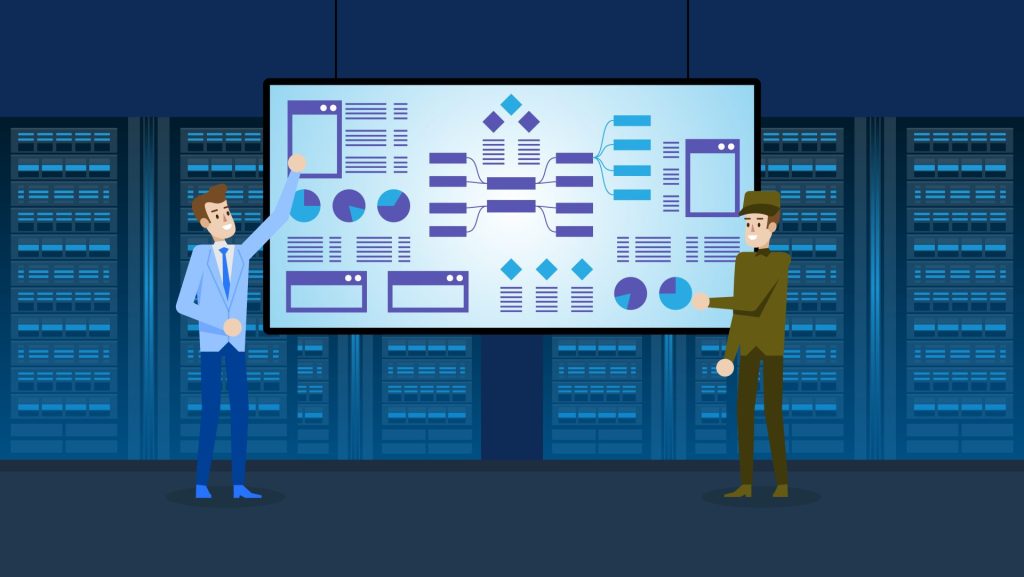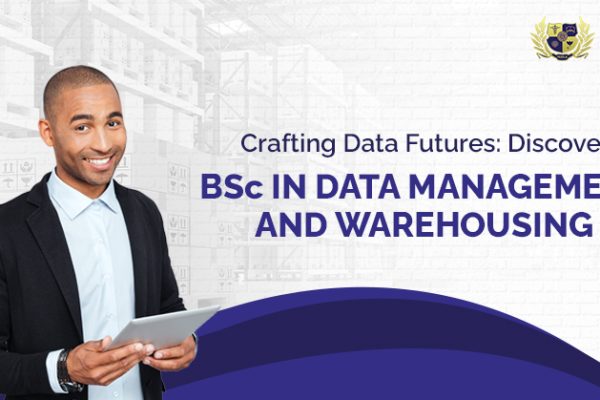|
Tired of Reading? Please listen to the blog
|
Blog Summary
The pursuit of excellence in obtaining a Bachelor of Science in Data Management and Warehousing unfolds through an invigorating 8-step journey. It commences with a foundational understanding of database systems and their intricate structures, paving the way for students to grasp the essence of efficient data management. The second phase delves into the world of data modeling, honing the skills necessary to architect robust databases. Subsequently, students immerse themselves in the nuances of SQL and other querying languages, acquiring the ability to extract meaningful insights from vast datasets. As the journey progresses, a focus on ETL (Extract, Transform, Load) processes emerges, guiding students in transforming raw data into valuable information. Advanced topics such as data warehousing principles and practices refine their comprehension of storing and retrieving data strategically. The penultimate step introduces students to the realms of business intelligence, enabling them to translate data into actionable strategies. Finally, the capstone phase consolidates the acquired knowledge, fostering a comprehensive mastery of data management and warehousing and positioning graduates for excellence in the dynamic field of data science.
Introduction
Data Management and Warehousing
Embarking on a Bachelor of Science in Data Management and Warehousing involves:
- Delving into the intricate realm of organizing
- Storing
- Analyzing data to extract valuable insights
Data Management entails strategically handling information across its lifecycle, ensuring its availability, usability, integrity, and security. Meanwhile, Warehousing involves storing and managing vast datasets within databases or data warehouses, facilitating efficient retrieval and utilization. Career Opportunities in Data Management and Warehousing empowers individuals to grasp these fundamental concepts, preparing them to navigate the evolving landscape of data-driven decision-making.
Importance of pursuing a Bachelor of Science in this field
The significance of pursuing a Bachelor’s degree in Data Handling becomes evident in today’s data-centric world. Organizations across industries rely on the effective management and interpretation of data to drive informed decisions, enhance operations, and gain a competitive edge. A B.Sc. in Data Management equips students with the necessary skills to become proficient in data collection, storage, analysis, and presentation. This educational path fosters technical expertise and cultivates critical thinking and problem-solving abilities, crucial for interpreting complex datasets and transforming raw information into actionable insights.
Understanding the Basics
Data management and warehousing concepts
Introduction to data management and warehousing concepts is pivotal for individuals aiming to excel in data handling. This domain revolves around the systematic organization, storage, retrieval, and analysis of vast data. A Data Management degree program, such as a B.Sc. in Data Management and Warehousing, offers a comprehensive understanding of database systems, data modelling, data architecture, and more. Students delve into the core principles of efficiently managing and maintaining data assets, ensuring data quality, security, and accessibility. This foundational knowledge is the bedrock for a successful career in the dynamic realm of data.
Foundational knowledge required for success
To thrive in data handling, aspirants must possess foundational knowledge encompassing various facets. Proficiency in database management systems (DBMS), SQL querying, data visualization, and statistical analysis forms the cornerstone of a Bachelor’s degree in Data Handling. Understanding these concepts enables students to navigate complex data structures, execute queries to retrieve specific information, and interpret data to derive actionable insights.
Importance of grasping the fundamentals
Grasping the fundamentals of data management and Warehousing holds immense significance in today’s data-driven landscape. Businesses rely on structured, organized data for informed decision-making and strategic planning. Proficient command of data assets ensures streamlined operations and empowers organizations to gain a competitive edge. A B.Sc. in Data Management studies instils the skills to handle large datasets efficiently, facilitating improved data-driven decision-making processes across diverse industries.
Aspiring professionals who comprehend the fundamentals of data management are well-positioned to contribute meaningfully to the evolving landscape of data analytics and Warehousing.

Choosing the Right Program
Factors to consider
Curriculum Content: Evaluate the curriculum content to ensure it covers essential areas such as data modelling, database management, data analytics, and warehousing technologies.
Faculty Expertise: Look for programs with experienced faculty members with practical industry knowledge and expertise in Bachelor’s degree in Data Management and Warehousing.
Industry Connections: Consider programs that offer opportunities for internships, industry collaborations, or partnerships to gain real-world experience and networking opportunities.
Technology and Tools: Assess if the program includes hands-on training with industry-standard tools and software in data management and Warehousing.
Flexibility and Specializations: Check if the program offers flexibility in coursework, allowing for specializations or concentrations tailored to specific interests within the field.
Overview of reputable institutions offering Bachelor of Science programs in Data Management and Warehousing
Numerous reputable institutions offer a Bachelor of Science degree in Data Management and Warehousing. These programs are designed to equip students with comprehensive knowledge and skills in handling data, databases, and data warehousing technologies. Institutions offering this degree often focus on providing students with a solid foundation in data-related disciplines, including data modelling, database management systems, data analysis, data storage, and retrieval techniques. They aim to prepare graduates to tackle the challenges of efficiently organizing, managing, and extracting valuable insights from large data sets.
These programs typically integrate theoretical knowledge with practical applications, offering hands-on experiences through projects, internships, and industry collaborations.
Specializations and concentration
Within the Data Management and Warehousing field, students can delve into various specializations and concentrations to tailor their education according to their specific interests and career aspirations. These concentrations include Data Analytics, Database Administration, Business Intelligence, and Data Engineering. Diverse specializations allow students to deepen their expertise in particular facets of data management, equipping them with specialized skills sought after by employers in the rapidly evolving data-driven landscape.
Curriculum Overview
In-depth analysis of the typical courses and subjects covered in the program
The curriculum of a Bachelor of Science in Data Management and Warehousing encompasses diverse courses tailored to equip students with a profound understanding of data analytics, database systems, and information technology. Core subjects often delve into database design, data modelling, data mining, and programming languages like SQL and Python. Additionally, coursework may encompass data visualization techniques, business intelligence, and the integration of data technologies. Advanced modules often focus on extensive data management, cloud computing, and cybersecurity, preparing students to tackle the evolving challenges in the data landscape.
Comprehensive curriculum in shaping future data professionals
A comprehensive curriculum is the bedrock for shaping proficient and agile data professionals. Exposing students to multifaceted disciplines within data management and Warehousingcultivates a versatile skill set crucial for thriving in this competitive field. The interplay of theoretical concepts with hands-on projects and case studies hones analytical thinking and problem-solving abilities. Moreover, a well-rounded curriculum keeps pace with industry trends, fostering adaptability and enabling graduates to navigate emerging technologies and methodologies confidently.
This educational framework not only instills technical prowess but also fosters critical soft skills, such as communication, teamwork, and adaptability, ensuring graduates are well-prepared to meet the multifaceted demands of the data industry.
Hands-On Learning and Practical Experience
Hands-on learning and practical experience are pivotal in data management and Warehousing. Internships, projects, and real-world applications offer invaluable opportunities for aspiring professionals to bridge the gap between theory and practice. Engaging in internships within esteemed organizations grants students firsthand exposure to industry workflows, tools, and methodologies. Through hands-on projects, individuals can apply theoretical concepts to real-life scenarios, honing their problem-solving abilities and adapting their knowledge to tackle complex data challenges.
Enhancing Skill Development with Practical Experience
Bridge the gap between theory and practice: Practical experience transforms theoretical knowledge into tangible skills, making applying concepts to real-world scenarios easier.
Develop problem-solving and analytical skills: Hands-on experience exposes data professionals to complex data challenges, requiring them to develop problem-solving and analytical skills to identify patterns, trends, and insights.
Gain confidence in their abilities: Practical experience builds confidence in data professionals, allowing them to tackle data-related tasks with assurance and expertise.
Enhance their employability: Practical experience differentiates data professionals from their peers, making them more attractive to potential employers seeking candidates with hands-on skills and problem-solving abilities.

Developing Technical Proficiency
Essential Tools, Software, and Technologies
Data Warehousing Platforms: Large volumes of organized and unstructured data may be stored and managed with the help of these platforms’ architecture. Teradata Vantage, Snowflake, Microsoft Azure Synapse Analytics, Google BigQuery, and Amazon Redshift are a few well-liked choices.
Data Integration and ETL/ELT Tools: These technologies make it easier to load, manipulate, and extract data into the data warehouse from various sources. Azure Data Factory, Talend Open Studio, Pentaho Data Integration, and Informatica PowerCenter are a few examples.
Data Quality Tools: These tools ensure data accuracy, consistency, and completeness within the data warehouse. Standard tools include Trifacta, IBM InfoSphere Quality, and Collibra Data Quality.
Data Visualization Tools: These tools enable users to explore, analyze, and communicate insights from the data warehouse through charts, graphs, and dashboards. Popular choices include Tableau, Power BI, Qlik Sense, and Looker.
Gaining proficiency in industry-standard tools
Gaining proficiency in these industry-standard tools isn’t merely advantageous; it’s necessary in today’s data-driven landscape. Professionals with technical expertise in these tools possess a competitive edge in the job market, securing roles in various industries where data management is paramount. Employers seek individuals well-versed in these technologies, recognizing their ability to streamline operations, optimize decision-making processes, and unlock insights from vast data repositories.
Being adept in these tools demonstrates competency and showcases an individual’s commitment to staying updated with the latest advancements, making them an invaluable asset to any organization looking to harness the power of data for strategic growth and decision-making.
Emphasizing Analytical Skills
The role of critical thinking, problem-solving, and analytical skills in data management
Critical thinking, problem-solving, and robust analytical abilities form the cornerstone of practical data interpretation and decision-making. Career in Data Management and Warehousing program, honing these skills becomes pivotal as individuals navigate complex datasets, discern patterns, and derive actionable insights. Proficiency in critical thinking enables professionals to ask pertinent questions, identify underlying issues, and approach data-related challenges with a structured mindset. Moreover, problem-solving skills empower data specialists to devise innovative solutions, troubleshoot discrepancies, and optimize data processes, fostering efficiency and accuracy in managing vast pools of information.
Strategies to improve analytical capabilities
Developing analytical capabilities within data management involves multifaceted strategies to enhance cognitive prowess and data interpretation methodologies. Students and professionals benefit from hands-on projects, case studies, and real-world scenarios to apply theoretical knowledge practically. Additionally, leveraging specialized software and tools tailored for data analysis aids in refining technical expertise while participating in collaborative problem-solving exercises fosters diverse perspectives, enriching one’s analytical toolkit.
Networking and Industry Connections
Importance of building a professional network
Networking opens doors to many opportunities, fostering connections that can drive career growth and success. Within data management and Warehousing, networking allows individuals to stay abreast of the latest trends, technologies, and industry insights. Engaging with professionals, alums, and industry leaders facilitates knowledge exchange and cultivates potential collaborations and partnerships. These connections often lead to valuable mentorships, access to exclusive job openings, and a deeper understanding of the evolving landscape of data-driven industries.
Ways to network and connect with professionals, alums, and industry leaders
A great way to network with industry experts and like-minded people is to attend conferences, seminars, and workshops. Engaging actively on professional networking platforms like LinkedIn allows individuals to showcase their expertise, connect with peers, and join industry-specific groups or forums. Additionally, leveraging alumni networks from educational institutions or participating in industry-specific events and meetups can facilitate valuable connections.
Continuous Learning and Growth
The dynamic nature of data management and Warehousing
Establishing a robust professional network becomes crucial as the landscape continually transforms with emerging technologies and methodologies. Networking opens doors to diverse perspectives, industry insights, and potential career opportunities. Engaging with fellow professionals, attending industry conferences, and participating in specialized workshops are prime avenues for fostering connections. Online platforms, such as professional forums and social media groups, offer rich spaces to interact, exchange ideas, and stay abreast of the latest trends.
Resources and avenues for continuous professional development
Continuous professional development stands as a cornerstone in the journey of BSc in data management and warehousing professionals. In such a dynamic field, staying updated with cutting-edge technologies, industry best practices, and evolving methodologies is paramount. Various resources, including online courses, webinars, and certifications, are vital tools for acquiring new skills and honing existing ones. Moreover, participation in hackathons, seminars, and specialized training programs facilitates hands-on learning experiences, fostering growth and expertise.
Conclusion
Embarking on the 8-step journey of a Bachelor of Science in Data Management and Warehousing offers an invaluable pathway into the dynamic world of data. Understanding the basics, selecting the right program, and honing technical proficiency are pivotal steps toward success in this field. Practical experience, analytical skills development, networking, and continuous learning further enrich this journey, positioning aspiring data professionals for a rewarding and impactful career. Take the plunge into this exciting domain, where the fusion of knowledge, skills, and passion for data promises an enriching and fulfilling professional expedition.
Unlock the Data Vault
Join our Bachelor’s program to unlock the secrets of efficient data management. Your gateway to a future-proof career starts here!











